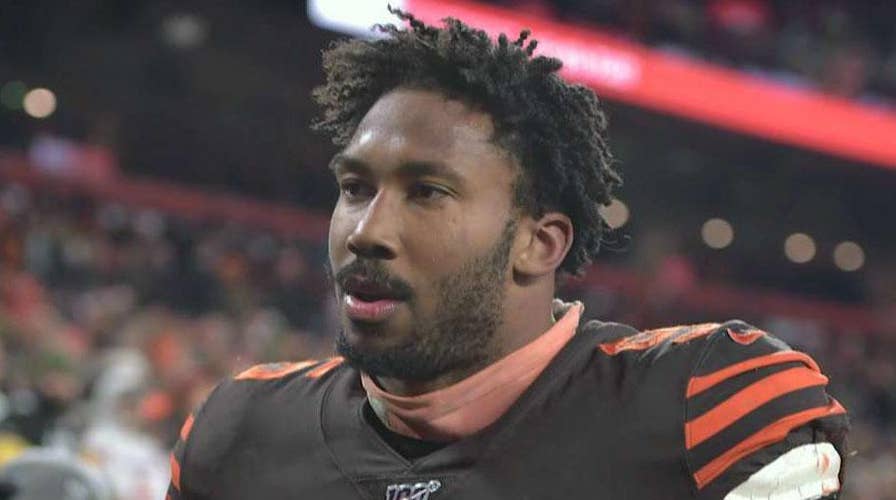Report: Mason Rudolph won’t file criminal charges against Myles Garrett
'Fox & Friends' co-host Brian Kilmeade weighs in on hot topics in the NFL and his new book 'Sam Houston and the Alamo Avengers.'
As a former NFL safety who spent five seasons getting banged up, bruised and more seriously injured in America’s most violent team sport, I share the outrage of millions of fans over the inexcusable assault committed on the field Thursday by Cleveland Browns star defensive end Myles Garrett.
I support the NFL’s decision to suspend Garrett without pay for at least the rest of this season and postseason (if the Browns have a postseason), and possibly longer. He was dead wrong to pull off the helmet of Pittsburgh Steelers quarterback Mason Rudolph and then use the helmet as a weapon to hit Rudolph on top of his unprotected head.
Garrett’s action triggered a brawl between players on both teams in the final seconds of their nationally televised game.
I understand why some people are saying Garrett’s punishment isn’t harsh enough, and are calling for criminal charges to be filed against him – charges that could send him to prison if he’s convicted. But that goes too far in my view.
More from Opinion
And you may be surprised that Rudolph – who was attacked by Garrett – agrees with me. Though Rudolph called the attack by Garrett “cowardly and bush league,” the Steelers quarterback said Friday he won’t press criminal charges against Garrett, leaving disciplinary action to the NFL.
And fortunately, Rudolph said he was not seriously hurt and was “good to go” for the Steelers’ next game Nov. 24 at Cincinnati.
Why don’t I think Garrett should face criminal charges, despite being clearly in the wrong in attacking Rudolph?
First, Garrett isn’t getting off with just a slap on the wrist. His unpaid suspension is the longest for a single on-field infraction in NFL history. He was also fined an undisclosed amount of money – most likely a substantial amount. I hope it’s big enough to make him feel some real financial pain.
In addition, both the Steelers and Browns were each fined $250,000 for the brawl.
I think Rudolph should have also received at least a small fine for provoking the attack he suffered – though that does not in any way justify Garrett’s actions.
But unless you’ve played a violent sport or engaged in real combat in the military (which is obviously far more dangerous), it’s hard to understand the emotions stirred up by going into the warrior mindset needed to protect yourself and get your job done.
Over the course of my career I played for the Minnesota Vikings, the New York Giants and the Arizona Cardinals, after playing four years of college football. When I watch some of my old game footage from covering kickoffs and making big hits, I cringe.
Now that I’m 40, it’s hard to believe that I enjoyed launching my body into other big and powerful men at full speed. I had a total of nine surgeries – six of which happened in my last three seasons.
Years later I contracted thyroid cancer, and I suspect the powerful pain medication I took before every game may have contributed to me getting the disease.
Just thinking about my playing days I’m reminded of the violent nature of professional football. While I loved playing the game, I can’t imagine doing it again 11 years after retirement
The one thing I vividly remember is my ability to go into a warlike mindset before I even stepped into the stadium. I would go to bed dreaming about running down the field at full speed, tracking a deep kickoff, splitting a wedge made of four men who all weighed over 300 pounds, and then crashing into a kickoff return man with the hope of a big hit that would make him fumble.
My warlike mentality completely minimized the reality that in every game I played, I was risking becoming paralyzed, knocked out, or seriously injured in some other way – or at a minimum getting my bell rung.
Before every NFL game I would take a pain pill and another at halftime. I also took shots of a powerful anti-inflammatory. Sure, football players are big and strong but we’re not made of steel. We get hurt – a lot.
Before each game I would crack open smelling salts and take a deep breath or two right before the opening kickoff with my special teams warriors. Smelling salts are a combination of ammonium carbonate and perfume used to restore or stimulate your senses. More commonly, they are used for waking people up who are unconscious.
All this is to say that I know from personal experience that the mindset and actions of an NFL player on the field are far from normal “civilian” behavior
And I understand – again, not justifying Garrett’s conduct – that it’s unfair to judge the actions of football players in the heat of the game by comparing them to the actions of employees in the civilian work environment.
Let’s be honest. As a football player, your job is to crash into your opponents with the intent to hurt them. Whether you like it or not, this is a very violent game. Political correctness has now caused many of our football “experts” and sportswriters to ignore this reality.
I’m not saying no one should ever be charged criminally for violence in sports. In fact, criminal arrests and convictions are more common than you may think in professional sports – particularly hockey.
Unlike football brawls, most of the hockey criminal cases have been much more premeditated and occur as retaliation for prior events. In a few cases, players have been charged with assault with a deadly weapon for using their hockey sticks to inflict major injuries on opponents.
Basketball has also had its share of on-court fights that have in some cases resulted in criminal charges.
In the infamous 2004 incident that became known as “Malice in the Palace,” an on-court fight between Indiana Pacers and the Detroit Pistons players exploded into a fight with fans in the stands, after a fan threw a beer at a player.
CLICK HERE TO SIGN UP FOR OUR OPINION NEWSLETTER
After the game, the NBA suspended nine players for a total of 146 games, leading to the players losing $11 million in salary. Five players were criminally charged with assault and eventually sentenced to a year of probation and community service.
Five fans also faced criminal charges and were banned from attending Pistons home games for life.
This fight actually deserved criminal charges, because it’s inexcusable for a player to attack a fan in the stands unless it’s in self-defense. And unlike football players, NBA players don’t need to go into a warlike mindset in a sport that penalizes intentional physical contact.
As for Myles Garrett, he deserves all the criticism he’s getting. He deserves his suspension and a big fine. But he does not deserve to go to prison. He deserves a criminal pardon.
CLICK HERE TO GET THE FOX NEWS APP
“Last night, I made a terrible mistake. I lost my cool and what I did was selfish and unacceptable,” Garrett said in a statement after he attacked Rudolph. “I know that we are all responsible for our actions and I can only prove my true character through my actions moving forward. I want to apologize to Mason Rudolph, my teammates, our entire organization, our fans and to the NFL. I know have to be accountable for what happened, learn from my mistake and I fully intend to do so.”
Let’s hope Garrett has learned a lesson that he will remember every Sunday he is kept off the field and for the rest of his life. Let’s hope other players also see they will pay a heavy price – short of prison time – if they let their emotions get out of control and act like violent thugs instead of athletes.








































